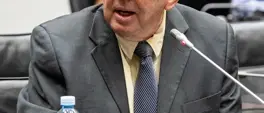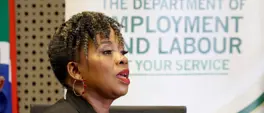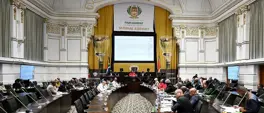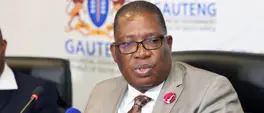Fuelling controversy: Creecy criticised for 25-year deal with big oil companies at critical Durban port facility
Paula Luckhoff
16 October 2025 | 17:40Transport Minister Barbara Creecy granted the terminal operator agreements at the Transnet Island View Precinct (IVP) without putting them out to tender.
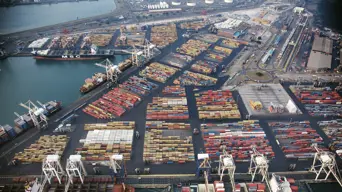
Durban container port. Wikimedia Commons/Media Club
Transport Minister Barbara Creecy is coming in for criticism over her decision to renew 25-year terminal operator agreements with international oil companies like BP at the Durban port's Transnet Island View Precinct (IVP).
The Portfolio Committee on Trade, Industry, Industry and Cooperation, and the Portfolio Committee on Transport have urged the Department to ensure that transformation targets are not overshadowed by commercial profits at the Precinct.
The issue that affected South African companies have, is that Creecy took this action without putting the contracts out to tender, reports Moneyweb.
These are very important contracts as the IVP is a pinch point in the fuel supply chain, notes Warwick Lord, chairperson of the Multimodal Inland Port Association (MIPA).
The Precinct stores about 70% of the country’s fuel imports - and since the Engen and Sapref refineries there shut down, SA is increasingly reliant on imports.
If you have control of these tank farms and the ability to get the fuel in and out of the country, you control a very large and very strategic asset, Lord goes on.
"And without the county having its own direct involvement in some shape or form, I feel that being at the total behest of the private sector comes with risks at times. I'm very much an advocate for private sector involvement but at the same time government needs to look after strategic assets, and I believe fuel and fuel shortages is definitely one of those."
On the positive side, these long leases provide security of tenure which then allows for capital investment and operations to really kick in, Lord says.
However, he does agree that shutting out new players in this way, does seem to go against government's emphasis on transforming the economy.
"It feels like this is going in a bit of a different direction to the rest of the supply chain discussion."
He was also a bit surprised by the Minister's decision, says Andrew Pike, Head of the Ports, Rail and Logistics Sector at global law firm Bowmans.
Creecy invoked Section 79 of the National Ports Authority Act, which allows her to bypass the normal licensing procedures in the national interest.
Pike reminds us that this was also invoked during the ill-fated Karpowership saga.
And, while he hasn't had eyes on the directive itself, he has a sense that Section 79 does in fact not allow the Minister to tell Transent that they don't have to go out to tender in this instance.
There is a softener to this he adds, understanding that the state-owned Central Energy Fund (CEF) which has taken over the Sapref refinery, has to be granted a certain amount of the capacity under each of these leases.
That capacity will ramp up over the next 20 years eventually to 30% and the CEF will then be an aggregator for new entrants, and give local companies a better shot, he explains.
Scroll up to the audio player to listen to the full conversation
Get the whole picture 💡
Take a look at the topic timeline for all related articles.


